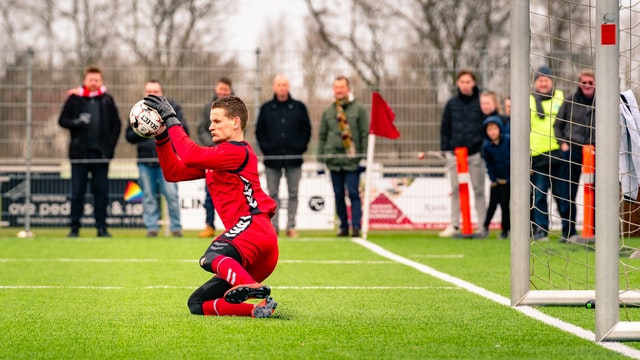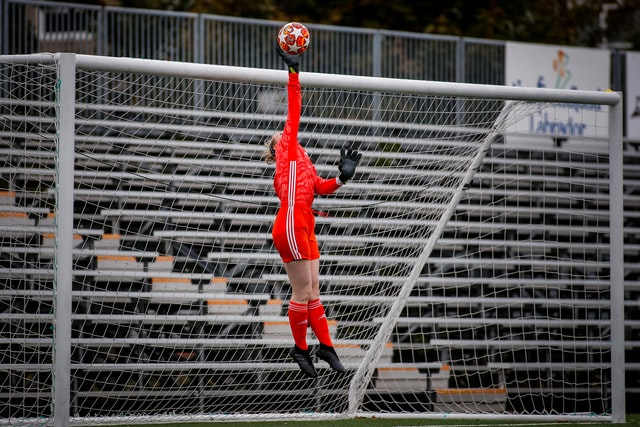Professional soccer goalkeepers are usually associated with large gloves. However, this has not always been the case.
There was a time when no soccer goalkeeper wore a glove during a soccer game. Yes, Goalkeepers used to play with their bare hands during the early days of soccer.
But the transition to wearing gloves was made over time and today, you rarely see a goalkeeper without their gloves.
So the question becomes, why did the goalkeepers decide that wearing gloves was a good idea?
Soccer goalies today wear gloves to avoid any unnecessary hand injuries and to make sure that they have an improved grip on the ball. The glove’s strong grip is especially helpful during rainy days when the ball is very wet and slippery.
So there you have it. These are the 2 main reasons why we have seen a transition from goalkeepers playing barehand to goalkeepers always having their gloves on during a soccer game.
But we’re not done here yet. We’ll dive more into each of the mentioned reasons, and we’ll answer a few other questions too throughout the rest of the article.
How important are the gloves for soccer goalkeepers?
As mentioned previously, the gloves of the goalkeeper work as protective equipment, and any effective protective equipment in any sport is always worth it.
This is especially true for goalkeepers because the goalkeeper position is arguably the most dangerous position in soccer.
The last thing you want as a goalkeeper is to block a ball that is traveling at a speed of 65 miles per hour (~105 km/h) with your bare hands.

There are some soccer players that are able to kick the ball with a speed up to 80 mph. Blocking a ball traveling at that speed without any gloves is certainly not a good idea.
It’s also worth mentioning that a soccer goalie’s gloves are designed specifically for the actions that the goalkeepers are expected to make during a game.
For example, you usually see the goalkeeper punching the ball a lot with their fist during corner kicks in order to send the ball away from the net.
For this reason, the gloves usually contain a thick layer between the ball and the bare fingers in order to protect the fingers of the goalkeeper while they are punching the ball.
This thick layer is generally designed to absorb the impact of the hit before it reaches the fingers of the goalkeeper.
The gloves can also be extremely helpful for the goalkeeper when it comes to maintaining a good grip on the ball. This is especially true during soccer games with heavy rain and snow.
The palm of the goalkeeper’s gloves are usually made up of latex and foam which can increase the friction between the ball and the gloves and in turn improve the grip of the goalkeeper on the ball.
For these reasons, the gloves can be viewed as an extremely important equipment for the goalkeepers in soccer.
Why are the goalkeeper’s gloves very large?
One thing you notice immediately when you look at a goalie’s gloves is that they are large and thick.
The main reasons are obviously to increase the protection that the goalies get from these gloves, especially when they are blocking balls that are traveling at a very high speed. But the goalkeepers can also benefit from the increased length of their hands when they wear the gloves.
It’s true that the increase of the length of the hand is minimal, but for the soccer goalkeeper, every centimeter counts.
There have been many scenarios in soccer in which the goalkeeper saves their team by barely touching the ball with the tip of their fingers.
In other words, the goalkeepers can always benefit from the extra length added to their hands.
Are the gloves required by the laws of the game?
Goalkeeper gloves are not required by the soccer laws of the game. The “Player’s equipment” section of the soccer rules doesn’t mention anything about the goalkeepers having to wear gloves during a soccer game.
As mentioned at the beginning of this article, there was a time when the goalkeepers didn’t wear gloves at all. Wearing the gloves back then was a new trend, but it was later adopted by most goalkeepers due to its effectiveness.
Today, if a goalkeeper decides that they don’t want to wear the gloves, they can, but why would they?
Professional goalkeepers get used to the gloves very quickly since they use them during their training sessions from the day that they decide they want to be a soccer goalkeeper.
The gloves become part of the goalkeeper’s hands and part of their identity on the field. So not wearing them won’t make any sense.
In other words, even if there aren’t any laws that require the goalkeepers to wear gloves, the laws of nature are a good enough reason to force goalkeepers to wear gloves.
With that said, we have reached the end of this article. If you are interested in learning more about other soccer equipment, then you can check these articles:

